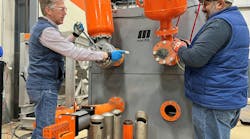BASF’s Crop Protection Div. says it will address challenges in food availability and quality of life in the Asia Pacific by introducing new technologies, broadening farmer education and co-creation initiatives and increasing investments in production capacity and R&D.
From 2008 to 2012, the Crop Protection division’s R&D expenditures have grown annually by 7% on average, from €325 million to €430 million, the company says, and it will continue to invest heavily in R&D projects in the future.
BASF is one of the leading chemical companies in the Asia Pacific region with a production network of more than 100 sites and operations in 16 countries. The company says it aims to grow two percentage points above the Asia Pacific chemical market through 2020 and in 2012 achieved €12.5 billion sales to customers in the region.
Biggest of the big
With sales of around €4.7 billion in 2012, BASF’s Crop Protection division provides innovative solutions in crop protection, turf and ornamental plants, pest control and public health.
Over the next few years, BASF also plans to spend on average €300 million annually on additional production capacities globally for its portfolio of agricultural solutions.
BASF will build a new formulation and packaging plant for crop protection products in Rudong, Jiangsu Province, China. With an annual capacity of 10,000 metric tons, the plant is expected to be fully operational in 2014 and will have more than 100 employees. "The site will cover nearly our entire solution portfolio, which will enable us to respond much more quickly and efficiently to growers’ needs in China and Southeast Asia," said Raman Ramachandran, senior vice president BASF Crop Protection Asia Pacific.
"Food security is back on the global agenda," says Professor Peter Warr, Australian National University College of Asia and the Pacific and guest speaker at the BASF Media Event. "Enhancing food security requires reducing the relative price of food, reducing poverty, and raising productivity through improved agricultural technology."
In many countries across Asia Pacific, BASF coordinates grower education initiatives, highlighted by the Samruddhi program in India and field schools in Indonesia. In 2012 alone, nearly 250,000 local growers participated in these initiatives. Participants receive practical advice and assistance throughout the entire growing season. In 2012, Samruddhi soybean farmers achieved an average of 25% more yield and 36% higher net profit compared to non-program farmers. Similar results were recorded by corn and rice growers as part of farmer field schools in Indonesia.
Moving ahead
BASF will expand its AgCelence portfolio for plant health in more than 10 additional crops, especially fruits and vegetables, in Asia Pacific by 2015. The AgCelence portfolio provides plants with better stress tolerance, growth performance and vitality to the Asian market, including soybeans, corn, cotton and select fruits and vegetables. "With AgCelence, farmers can potentially increase marketable yields by 5-10% as well as improve their farming efficiency," said Ramachandran.
"Asia Pacific is facing unprecedented challenges in maintaining natural resources, food and nutrition and quality of life. By collaborating closely with customers, partners and communities in Asia Pacific, we can address these challenges through chemistry-based solutions," said Gops Pillay, President, South and East Asia, ASEAN and Australia/New Zealand, BASF.


